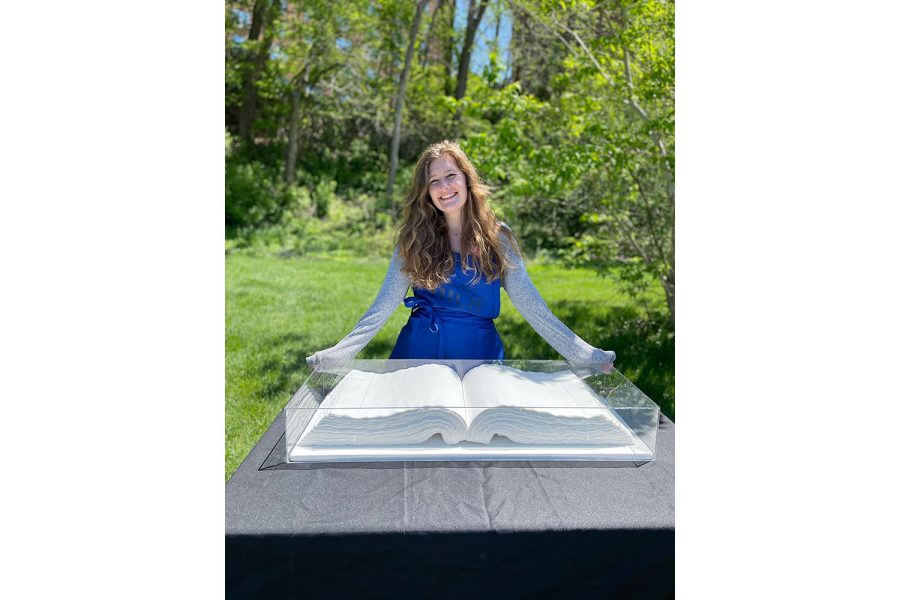UI Fulbright recipients to travel abroad for first time since start of pandemic
The University of Iowa is sending 22 students and three faculty are traveling abroad for their Fulbright awards for the 2021-22 academic year.
Fulbright 2021 scholar Sarah Schlosser poses for a portrait. Schlosser will travel to India in spring 2022 and live there for nine months.
November 28, 2021
The University of Iowa U.S. Fulbright Program awardees will travel abroad, after candidates were deferred because of the pandemic last year.
In total, 22 students and three faculty members from the UI will study abroad for their 2021-22 Fulbright awards.
Thirteen of the 22 student winners, more than half, are deferred from the 2020-21 academic year.
The Fulbright program provides grants for research projects and English teaching assistant programs to take place during one academic year in a participating country outside the U.S.
Fulbright recipients are selected on the basis of academic or professional achievement, as well as demonstrated leadership potential in their fields. The program spans over 160 countries worldwide.
Russell Ganim, UI International Programs associate provost and the dean, said it is great that recipients are finally allowed to travel again.
“Because of COVID, there were some instances where the awardees had to put off their travel for 18 months, and now they’re finally getting a chance to go,” Ganim said.
The UI was named a top producer of Fulbright students nationally for the sixth year in a row for the 2020-21 academic year.
Ganim said this recognition has led to increased applications from students and alumi.
“The word gets out that if you’re from Iowa, you have maybe a 50/50 chance of actually getting one of these awards,” he said. “Fulbright at the University of Iowa remains quite popular, and this is an option that students and alums see as quite viable if they want to pursue a career or further study in a global space.”
UI Fulbright winner Sarah Schlosser will travel to India in spring 2022, where she will live for nine months.
She said she will work with artisans in the area to document the processes of natural dyeing, and take these processes to the Kumarappa Institute of Hand Paper Making in Rajasthan to build the best practice guide for preserving this tradition.
Schlosser said a print exchange during her first semester is what inspired her to submit a Fulbright application.
“I had no access to equipment, but I had a bunch of handmade paper and was like, OK, if I figure out how to naturally dye it, then I can still be a part of this print exchange,” Schlosser said.
Schlosser said she got some turmeric and then stumbled across a high school science experiment that found, if you change the turmeric’s pH levels, the plant will change color, which led to a yearlong research project.
“As I was going through this process, there were a lot of discrepancies that kept coming up in western research where I would look at a craft manual and the crafts work is not reflective of the science,” she said. “So after hitting a frustrating wall, I was like, I think I just need to go to India, and then my professor started helping me apply for the Fulbright.”
Schlosser, who received an MFA in book arts from the UI in May, said it feels surreal to be recognized with a Fulbright after how much time she put in preparing her application.
“My application had gone through so many revisions because the staff at UI is so great at helping those who want to apply [and] create the best application that they can,” she said. “They kept moving me forward through each round, and I kept just being so stunned because I know it’s a competitive application.”
UI Professor Christopher Merrill, director of the UI International Writing Program, traveled to Russia on a Fulbright grant in 2018 and was recently awarded a second grant to live in Poland for six weeks.
“It’s really nice,” he said. “The opportunity to spend a concentrated period of time working with younger undergraduate students is very exciting for me.”
Merrill said he will work with colleagues at Adam Mickiewicz University in Poznan to attempt creating a program similar to the UI Writers’ Workshop and both the nonfiction and international writing programs.
Merrill said he hopes inspire new work on his second Fulbright trip.
“I hope to have the kinds of experiences that will inspire new ways of thinking about how we write in this complicated moment in history, and to make some new friends,” Merril said. “That’s really what you look for in a Fulbright.”



